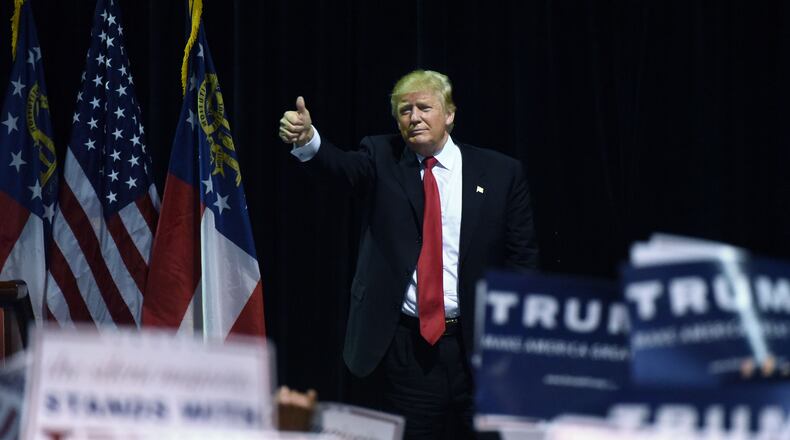In August 2014, citizen-journalist Nydia Tisdale was at a pumpkin-farm gathering of the Republican general election ticket in north Georgia, a public event on private property.
Gov. Nathan Deal was in the audience. Tisdale was close by, her video camera pointed at the stage and state Insurance Commissioner Ralph Hudgens, a man with a reputation for impolitic statements that play well on YouTube.
Organizers panicked.
At least one other journalist was on the scene, but Tisdale was the only one singled out and told to stop recording. When she didn’t, a Dawson County sheriff’s deputy dragged her away, pinned her face-down on a nearby table, placed her in handcuffs and tossed her in the hoosegow.
Attorney General Sam Olens took the stage soon afterwards, and while he used more polite phrasing, in essence wondered aloud whether his fellow Republicans had lost their minds.
Last Tuesday, Tisdale was arraigned on charges associated with the event. The arresting deputy, by the way, is on the May primary ballot. He’s running for sheriff.
“I would suspect there are a number of issues, including First Amendment issues, that have to be litigated pretty thoroughly,” said Bruce Harvey, Tisdale’s attorney.
“Some of the issues of the case are going to be whether it was a public or private event, and whether she had permission or not. And then the overreaction. There are a number of issues to work through,” he said.
It isn’t often that Georgia Republicans are pioneers. But in this case, they were 18 months ahead of the curve. The incident at Burt’s Pumpkin Farm in Dawsonville was, in fact, a precursor to a new, defining feature of politics in 2016 – the privatized presidential rally.
Other candidates have engaged in culling potential disruptors – whether inconvenient reporters or suspected counter-demonstrators -- from their mass gatherings. Prior to Georgia’s primary earlier this month, two black college students were ejected from a Hillary Clinton rally at Atlanta City Hall by police, for scrawling “Black Lives Matter” on the back of a campaign sign.
But it is the Republican campaign of Donald Trump that has carried crowd (and press) control to a new extreme. Two things you can always count on at his raucous rallies: Loud music, and the disembodied male voice that makes it clear that “this is a private event paid for by Mr. Trump.”
Dissent, the announcer continues, is something that should occur someplace else. And not just noisy dissent. Funny looks will do. In Valdosta, on the day before Super Tuesday, 30 black students were ejected from a Trump rally after standing silently at the top of a set of bleachers.
At this stage of the campaign, the U.S. Secret Service is offering its protection to all presidential candidates. And when the young man rushed a Trump stage in Dayton last weekend, agents showed themselves quickly enough.
The federal law enforcement agency has had to make clear that the political preferences of attendees at Trump rallies is none of its business. But singling out the unwanted can all be perfectly legal, according to constitutional scholars we’ve asked. At a private event, the owner rules. If you scratch your nose with the left hand rather than the right, you’re gone.
That’s why -- when Mr. Trump says “Get him out of here!” – they do.
In Florida, a columnist for the Orlando Sentinel attended a Trump rally as a civilian. He was a curious fellow not on deadline. But he was ejected when his profession was discovered.
You see, at Mr. Trump’s private events, all journalists are to be held in a pen. Literally. They’re not allowed to wander unescorted, to chat with those in the audience or the occasional protester being removed -- presumably because their only job is to listen to Mr. Trump.
When the candidate was in Atlanta, some elasticity was achieved once I asked if a Trump campaigner really intended to follow a 60-year-old man into a stall to watch him tinkle.
Nonetheless, the control that Mr. Trump exerts at his private events is extraordinary.
That press pen? It's always in the center. Video clips of Mr. Trump at his rallies always show the candidate straight on. No other angle is permitted, according to a report this week by Buzzfeed.
Mr. Trump often complains that TV cameras at his rallies never show his massive crowds. But they can’t. They’re not allowed to. Those are the rules by which Mr. Trump allows TV cameras into his events.
Again, Mr. Trump isn’t creating a trend, but he’s taking it to a new and uncomfortable level. And the next time you’re at a political rally, whether one featuring Mr. Trump or someone else, it's worth asking whether you’re really a spectator – or just another one of the performer’s props.
About the Author
The Latest
Featured




